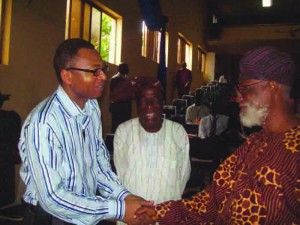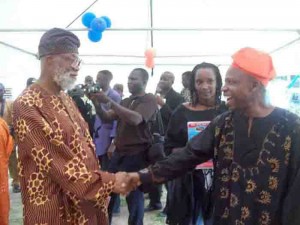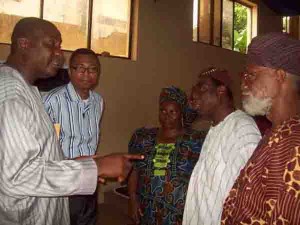ECHOES OF HOPE FROM THE FESTIVAL OF INDIGENOUS AFRICAN FILM
Even without a major sponsor and government’s support, this year’s Behind The Screen, a building capacity workshop in the Nigerian film industry which has now transformed to the Festival of Indigenous African Films was a huge success in all ramifications.
Organizedby one of Nigeria’s foremost films and records production companies, Remdel Optimum Communication, Akure, the festival, which ran between Sunday, 23 and Thursday, 28 August provided a better platform for stakeholders in the thriving movie business in Nigeria to rub minds, charter a good cause for the development and improvement of the industry which only known enemy is piracy!

The theme of the well organized festival; “Impact and Survival of African Indigenous Languages Films”, according to its director, Pastor (Mrs.) Biodun Ibitola was deliberate. “As we all know, the ultimate survival of any culture depends largely on the survival of the language through which it is transmitted from generation to generation, as well as to other cultures for assimilation. Regrettably, colonization has not only intruded into African indigenous languages, but has eroded it so much to the extinction. If we are not careful, we Africans may in the near future have to learn our own languages as we do to foreign languages at the moment,” she said.
The festival director urged for a drastic change of attitude to the study and use of our indigenous languages in Africa, and Nigeria being the indisputable big brother of the black race, must take a lead in this direction.

“This is the reason we have chosen, through what we know how to do best, that is, film production, to take the lead in our efforts to contribute our quota to the on-going efforts at re-branding Nigeria, through the effective packaging of Nigerian indigenous languages in films to other parts of the world.”
All the participants that contributed to the four-day festival collectively challenged the governments at all levels to pay more attention to the entertainment industry which is capable of generating enormous resources to their coffers in the face of dwindling resources from the federation account. The participants also urged the government to give out soft loans to practitioners in the entertainment industry just as it has been doing in other

sectors of the economy while equally noting that the sector has so far thrived through personal efforts of stakeholders as the government even failed to combat piracy which has eroded the scarce and lean resources of individual investors in the industry.
Delivering a lecture entitled “The Impact and Survival of Indigenous Languages in Films”, the Director-General, Centre for Black and African Arts and Civilisation (CBAAC), Prof. ‘Tunde Babawale concluded that African Indigenous languages constitute the golden pot of our heritage and positive attempts and strategies to ensure their survival should be encouraged and supported.
According to him “language confers on films an enduring visual character, for is language that drives the action. During the silent film era, the audience was left to interpret actions to create meaning. But with the introduction of sound/language, words could now be matched with action and communication among the cast is enhanced.

“One major impact of indigenous languages films is the preservation of such languages. Production of films in Africa indigenous languages therefore helps to save such languages from total relegation. When it is realized that at least one language out of the world’s 7,000 languages disappears every two weeks according to UNESCO, then the importance of preservation cannot be overemphasized.”
Prof. Babawale argues further that the use of African Indigenous films is also a means of propagating African tradition, culture and norms. “Language serves as a memory bank for the tradition, culture, norms and aspirations of a people. Films in indigenous African languages therefore serve as electronic database for the preservation and propagation of such languages.”

In his goodwill message, the Governor of Ondo State who was represented by a renowned visual artist and the State’s Commissioner for Culture and Tourism, Mr. Tola Wewe said the state is working on film village to boost culture and tourism in the state. He commended the organizers of the event for taking the
lead and also for the bold step which would also put the state into focus. “The government welcomes genuine initiative from individuals that will put the state into global reckoning. We appreciate what Remdel is doing and we promise to support genuine initiative such as this,” said the Commissioner.
Renowned filmmakers, Pa Adebayo Faleti and Prof. Akinwunmi Ishola urged the government to embrace similar initiative such as Remdel’s. “Remdel is doing government job, it is the responsibility of a responsible government to organize a forum like this for professionals to come together and rub minds on the way forward for their respective sectors.” They also commended the singular effort of the organizers for their foresight and the struggle to promote indigenous language through their productions.”
Other keynote speakers at the four-day festival which was held at the Cultural Centre, Adegbemile, Akure includes Chief Joseph Sanya Oyinsan who spoke on Indigenous Languages in Modern Day Broadcasting, Prof. Mabel Evwierhoma spoke on the Grassroot Mobilisation in The New Distribution Network while Barrister Ajibola Bashir Suraj spoke on the Key Legal Aspects of the Entertainment Industry.
Remdel Optimum Communication (ROCOM), has produced and marketed world-class movies such as Afonja, Odidere, Owo Eje, Ogiri Oko, Ofinga and several others. The company has also produced outstanding documentaries for some government parastatals and started a capacity building workshop in 2007 known as Behind The Screen Workshop which has now transformed to a full fledged film festival.
